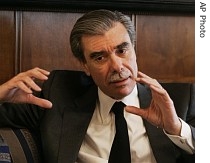2007年VOA标准英语-US Official: No Plans to Scrap Cuba Embargo(在线收听)
Washington
21 February 2007
The Bush administration is defending the U.S. economic embargo of Cuba, despite the transfer of executive power on the island from ailing president Fidel Castro to his brother, Raul. VOA's Michael Bowman reports from Washington, where U.S. Commerce Secretary Carlos Gutierrez spoke at length about the embargo Wednesday.
For more than four decades, U.S. law has forbidden American companies from doing business in communist Cuba. In recent years, however, the U.S. government has permitted limited sales of food and medicine to the island that must be purchased with cash.
Speaking at an event organized by the Council of the Americas, Commerce Secretary Gutierrez rejected the Cuban government's oft-repeated contention that the U.S. embargo is responsible for the island's persistent economic woes.
 |
| Commerce Secretary Carlos Gutierrez speaks during an interview at the Department of Commerce in Washington |
he said. "The embargo is not the problem. The problem is the repressive communist system, and the only solution is to change the system."
But some foresee change on the island in a post-Fidel Castro era. The Cuban leader had intestinal surgery last July and has not been seen in public since. Power has been handed over to Fidel's brother, Raul Castro, who is viewed by many as more pragmatic and less wedded to strict communist orthodoxy than his elder sibling.
Brian Latell is a Latin America analyst who has worked at both the CIA and the U.S. National Intelligence Council.
"Some of the top generals around Raul I consider to be modernizers: men who, like Raul, I believe are attracted to the China model: no political opening, but opening of the economy," he explained.
Should the United States relax the embargo of Cuba to reach out to Raul Castro? Absolutely not, according to Commerce Secretary Gutierrez, who was born in Cuba and whose family came to the United States after the island's 1959 communist revolution.
"Cubans on the island are economic captives and they are political captives," he added. "They have become the workers of this hemisphere's last plantation. Forty-eight years of history have shown us that changes will not occur under Fidel Castro or under Raul Castro. And we believe it is naïve to think otherwise."
Nevertheless, some U.S. industries see a potentially lucrative market in Cuba, home to more than 11 million people hungry for basic staples as well as consumer goods.
It has been pointed out that the United States does business with other communist nations, such as China and Vietnam, and, in decades past, forged a limited commercial relationship with the former Soviet Union. But Secretary Gutierrez says he views Cuba more in line with North Korea, with whom the United States has no commercial or formal diplomatic relations, than with China, with whom the United States has robust economic ties.
Commerical dealings with communist nations have always required the United States to set aside ideological and political differences in order to allow beneficial trade, according to John Kavulich, a policy adviser to the U.S.-Cuba Trade and Economic Council, based in New York.
But while the council advocates expanding commercial ties between Washington and Havana, Kavulich acknowledges that bilateral trade is a weak tool for promoting change in Cuba.
"We have really become marginalized and pretty irrelevant, because no matter what we do someone has come to Cuba's rescue," he said. "And so they have no incentive to make any changes. That makes us somewhat impotent."
Kavulich notes that Cuba's economy was once propped up by the former Soviet Union. Today, Venezuela under President Hugo Chavez provides Cuba with more than $2 billion in fuel and other assistance each year.